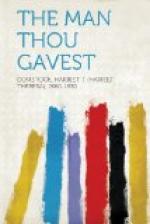But this room upon which he was now looking was different from anything he had ever before seen in the workshop. It interested and puzzled him.
Lynda’s specialties were libraries and living rooms; there were two or three things she never attempted—and this? Truedale looked closer. How pretty it was—like a child’s playroom—and how fanciful! There was a fireplace off in a corner, before which stood a screen with a most benign goblin warning away, with spread claws, any heedless, toddling feet. The broad window-seats might serve as boxes for childish treasure. There were delectable, wee chairs and conveniently low stools; there was a tiny bed set in a dim corner over which, on a protecting shield, angels with folded wings and rapt faces were outlined.
“Why, this must be a—nursery!” Truedale exclaimed half aloud; “and she said she would never design one.”
Clearly he recalled Lynda’s reason. “If a father and a mother cannot conceive and carry out the needs of a nursery, they do not deserve one. I could never bring myself to intrude there.”
“What does this mean?” Truedale bent closer. The table had been painted white to serve as a floor for the dainty setting, and now, as he looked he saw stains—dark, tell-tale stains on the shining surface.
They were tear-stains; Lynda, who so joyously put her heart and soul in the ideals for other homes, had wept over the nursery of another woman’s child!
For some reason Truedale was that day particularly open to impression. As he sat with the toy-like emblems before him, the holiest and strongest things of life seized upon him with terrific meaning. He drew out his watch and saw that it was the dinner hour and the still house proved that the mistress was yet absent.
“There is only one person to whom she would go,” he murmured. “I’ll go to Betty’s and bring Lynda home.”
He made an explanation to Thomas that covered the situation.
“I found what the trouble was, Thomas,” he said. “It will be all right when we get back. But don’t keep dinner.”
He took a cab to Brace’s. He was too distraught to put himself on exhibition in a public conveyance. Brace sat in lonely but apparently contented state at the head of his table.
“Bully for you, old man,” he greeted. “You were never more welcome. I’ll have a plate put on for you at once. What’s the matter? You look—”
“Ken, where’s Betty?”
“Run away to herself, Con. Went yesterday. Goes less and less often, but she cut yesterday.”
“Has—has Lynda been here to-day?”
“Yes. About three. When she found Betty gone, she wouldn’t stay. Sit down, old man. You’ll learn, as I have, to appreciate Lyn more if she isn’t always where we men have thought women ought to be.”
Truedale sat down opposite Kendall but said he would take only a cup of coffee. When it was finished he rose, more steadily, and said quietly:




